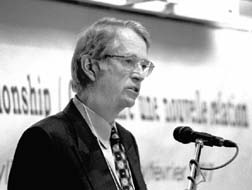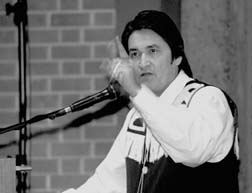Royal Commission on Aboriginal Peoples:
Will study bring sweeping change or prove costly exercise in futility
The Report of the Royal Commission on Aboriginal Peoples was released in November of last year, the final result of a five-year, $51.2 million effort to examine all aspects of aboriginal life in this country. A three-day conference, organized by McGill's Institute for the Study of Canada, was held January 31-February 2 to discuss the Royal Commission's findings. There were dozens of invited speakers representing a variety of interests and opinions. Writer Sylvain Comeau attended some of the sessions to get a sense of the reactions to the report.
 |
The Hon. Joe Clark joins Rose Chi-kwa-kii-a-hen Nixon in a song during the closing ceremonies
[ ALL PHOTOS: OWEN EGAN ] |
The massive undertaking of The Royal Commission on Aboriginal Peoples has culminated in an equally impressive 4,000-page document containing hundreds of recommendations. But despite the huge amounts of time and money invested, many of the speakers participating in the conference at McGill early this month expressed fears that the report is already gathering dust on a Liberal government shelf.
The report came in for nearly unanimous praise throughout the weekend's discussions. Aside from a few conspicuous dissenters, speaker after speaker urged the federal government to adopt some or most of the report's 440 recommendations.
Commission co-chair the Honourable Justice René Dussault opened the conference by saying he worries that the recommendations may be ignored, repeating the mistake he says was made following the Royal Commission on Bilingualism and Biculturalism in the late '60s.
"We only have to look at the situation in Canada today, 30 years after the report of the Commission on Bilingualism and Biculturalism, to see the consequences of refusing to apply carefully considered solutions. We fear that the same situation will recur, if we are not careful."
Dussault gave the government some benefit of the doubt on the Prime Minister's announcement that no important changes will be made before the next elections.
"We have always believed, and we said so in our report, that the government will need six to nine months to prepare to meet the challenge we have posed. That doesn't mean, however, that our recommendations should not be the subject of a public debate, starting now and in the coming months."
But if the government fails to act, the media may not have helped to encourage the Canadian public's support, according to Dussault.

 |
| Royal Commission co-chairs René Dussault and Georges Erasmus |
"I am disappointed, although not surprised, that the media has focused on the costs of our recommendations. It would have been irresponsible on our parts to suggest fundamental changes without discussing what it would cost to realize them--or what it would cost to do nothing. Thus, we have included what it would cost in both cases. But the media is more interested in the short-term costs than in the value of the recommendations."
The Commission's recommendations include the creation of an aboriginal parliament, the creation of an independent lands and treaties tribunal to decide on land claims, and the provision of "an adequate land base" for the Métis.
The Commission's other co-chair, Georges Erasmus, followed Dussault's presentation on Friday by offering the vision of the future which lies behind such recommendations.
"We see Canada in the 21st century as a single nation state within which about 60 aboriginal nations would exercise jurisdiction and law-making authority over a wide range of instruments of governance, on a renegotiated and, in most cases, extended land base.
"Aboriginal people would be citizens of their nations and of Canada. The Canadian government's treaty obligations would be to aboriginal nations, rather than to individuals, with those nations deciding how best to spend the resources so allocated."
Matthew Coon-Come, Grand Chief of the Grand Council of the Cree, spoke next and came out strongly in favour of that vision.
"I am here to deliver a simple message: what the Commission has recommended, I believe, is not a matter of choice. The recommendations are urgent and imperative. We can debate the details, but there must be a fundamental re-balancing of Canadian society. The alternative--to do little or nothing and to continue with the present inadequate approaches--is simply unacceptable."
He reminded the audience that the status quo is marked by terrible living conditions for many aboriginals.
"Every year, the Canadian Human Rights Commission reports that the treatment of aboriginal peoples in Canada violates domestic and international human rights. Despite the litany of social and other ills facing aboriginals, we retain our humanity, our laughter, our patience--which we're slowly running out of--and our desire to coexist, in a spirit of respect and sharing."
Daniel Turp, professor of international law at Université de Montréal and aspiring head of the Bloc Québécois, provided a sovereignist point of view on the recommendations.
 |
| Ovide Mercredi |
"It is vital for sovereignists like me not to stick their heads in the sand and ignore the variety and diversity of the peoples who make up Quebec and Canada. The Commission report is inspiring, a breath of fresh air in a political landscape which is attempting to deny the existence of Canada's peoples, whether the aboriginals, the Acadians, or the people of Quebec."
The only voice raised in opposition to the recommendations on Friday belonged to University of Calgary professor of political science Thomas Flanagan.
"What bothers me the most about these recommendations are the economic repercussions. I don't think they will be followed, but if they were, they would be enormously wasteful and would not achieve the objective of raising the standard of living of aboriginals. They would only succeed in enriching a small layer of consultants, lawyers, politicians and middlemen."
The most reliable method for aboriginals to achieve a higher standard of living, according to Flanagan, is to make more inroads into the mainstream Canadian economy.
"The only way to enjoy the fruits of the Canadian economy is to participate in it directly as an individual rather than through some kind of political process, as a citizen in a First Nations' government."
Southam News national affairs columnist Andrew Coyne found himself similarly isolated in his opposition at the conference's closing session on Sunday. Coyne attacked what he sees as a divisive tribalism encouraged in the document.
"The report is an exemplar of identity politics. My problem is not with identity as such--people are entitled to feel kinship or community on any basis they choose--it is with the elevation of identity above other concerns, like fairness, freedom, or that broader allegiance we owe to humanity. It is with the singling out of one identity over all other possible forms of association. We are all the composite of so many different types of identities."
Coyne specifically criticized the recommendation that an aboriginal parliament should be created.
"How are we to rank contending claims for association? For example, why a separate house of parliament for natives, and not for Quebecers, or for women? It becomes a contest of raw power, and--especially in this media age--of emotional power. Whoever is angriest, wins."
Coyne's speech was greeted by scattered yells of "shame," and followed by a much more popular counterpoint from Assembly of First Nations National Chief Ovide Mercredi.
"Whoever is angriest wins? My voice has been angry for a long time, but are we winning? Have you seen us win anything lately? The future of aboriginals in this country is that our rights will be fought against at every turn," Mercredi bitterly predicted.


 |
| Tom Flanagan, Daniel Turp and Matthew Coon-Come |
"Politicians will say that Canadians already pay too much in taxes, and give too much to aboriginals. You can keep your taxes; we want the land, the resources, and royalties from those resources."
Accompanied by frequent cheers, applause, and even the beating of a drum, Mercredi decried aboriginals' state of dependency on social assistance.
"To end the dependency on welfare, we have to correct the mistakes of the past. The Commission is on the right track."
Former Prime Minister Joe Clark, a veteran of the Meech Lake and Charlottetown constitutional battles, closed the conference with an urgent appeal to supporters of the report.
"I think there is some danger that this work could be lost; my view is that the government of the day is not worried about this so much because it didn't create it." (The Royal Commission was launched by the Mulroney government in 1991, after the Oka crisis.)
"If this becomes one more failure, the result could be incendiary for our country," Clark warned. "We live in a very impatient time; people and groups who feel that their basic interests are systematically ignored by the larger society find other alternatives, whether those are movements for independence, million man marches, or escalating incidents of public protest, which can easily become violent.
"I hope, instead, that this document will be a turning point in the relations between aboriginals and other Canadians."